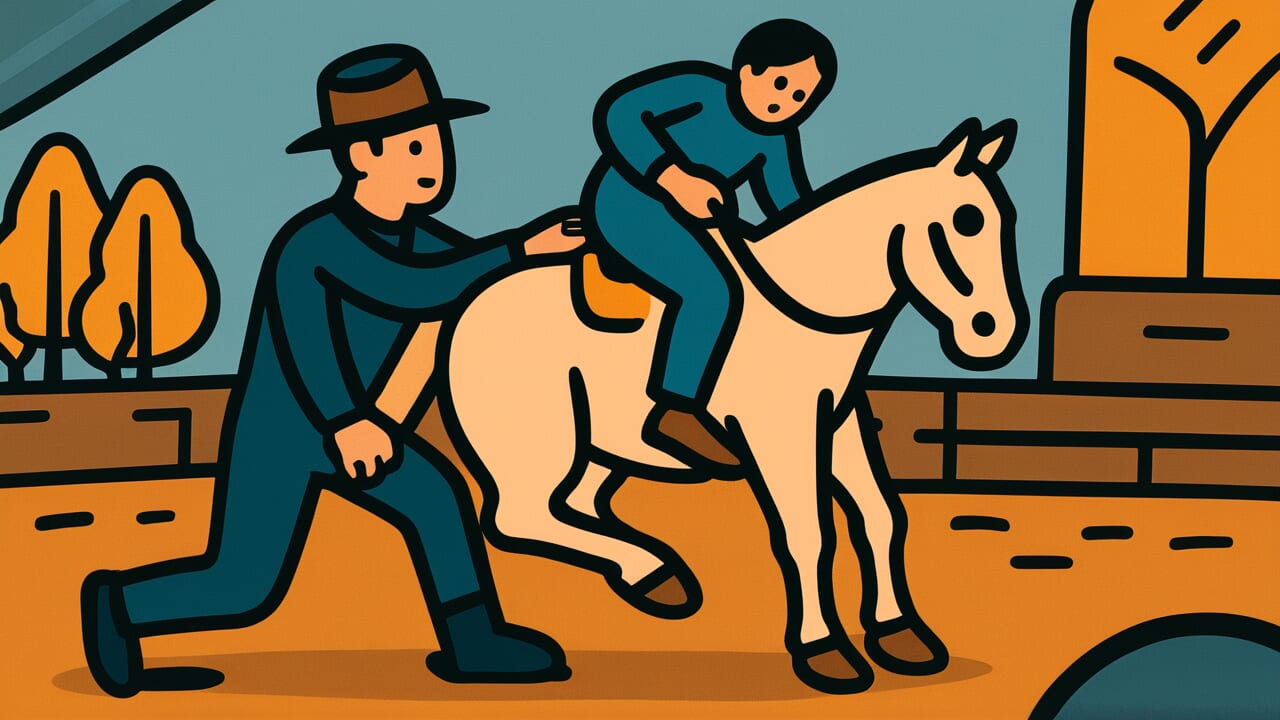How to Read “Obtaining it while on horseback”
ba-jō-ni-i-te-ko-re-wo-u
Meaning of “Obtaining it while on horseback”
“Obtaining it while on horseback” means that true results and understanding come only through action and direct experience.
Just thinking or planning gets you nowhere. Like riding a horse into battle, you must experience things yourself to gain real results.
This proverb emphasizes the difference between theory and practice. No matter how much knowledge you gather or how much you prepare, real results come only through action.
In sports or work, you learn things only by actually doing them. The lessons and results you gain from experience cannot be obtained through study alone.
Today, people use this saying to stress the importance of taking action and embracing challenges.
It speaks to those who fear failure or keep preparing without taking the first step. The message is clear: you must actually try to gain anything meaningful.
Origin and Etymology
This proverb likely comes from ancient Chinese classics. “Obtaining it while on horseback” uses classical Chinese phrasing.
“On horseback” literally means being mounted on a horse. “Obtaining it” means gaining something.
In Chinese history, people often gained control of nations through military force. They rode horses across battlefields and won through actual combat.
This is the original meaning of “Obtaining it while on horseback.” However, the saying has a continuation: “You cannot govern it while on horseback.”
This teaches that conquering through force and actually governing require different skills. The saying contains deep insight about power and leadership.
In Japan, the first part became independent and widely used. It came to mean “gaining results through actual action.”
The structure pairs “being there” with “obtaining,” clearly expressing the relationship between action and results.
Usage Examples
- He researched studying abroad for years, but after actually going, he truly understood the meaning of “Obtaining it while on horseback”
- Reading business books alone won’t make you successful; as “Obtaining it while on horseback” suggests, you learn most things only by actually starting a business
Universal Wisdom
“Obtaining it while on horseback” has been passed down because it addresses a fundamental human conflict.
This is the conflict between wanting to stay safe and wanting to achieve something meaningful.
People instinctively avoid risk. We prepare extensively, make detailed plans, and try to minimize failure. This is natural survival instinct.
But humans also have a strong desire to grow and accomplish things. These two desires often clash.
Our ancestors deeply understood this human nature. They realized a profound truth: no amount of preparation matters without action.
Without mounting a horse, you’ll never know what happens on the battlefield. Reading about swimming won’t teach you to swim without entering the water.
This proverb survives because human nature remains unchanged across time. Modern people feel the same anxiety before acting.
We still procrastinate under the guise of preparation. But true results and understanding always belong only to those who actually experience things.
This is an unchanging law of human society.
When AI Hears This
This proverb about obtaining things while on horseback aligns remarkably with recent brain science research.
When humans walk or ride horses, theta waves increase in the hippocampus. These special brain waves deeply affect memory formation and spatial awareness.
In other words, the brain operates in a different mode during movement.
More interesting is how horses function not just as transportation but as part of the cognitive system. Horses sense human intentions, judge terrain, and avoid danger.
The rider essentially uses the horse’s sensory organs and judgment as extensions of their own brain. This perfectly demonstrates what extended cognition theory calls “tools becoming part of thought.”
Stanford University research confirms that creative thinking improves by an average of 60 percent while walking compared to sitting.
On horseback, vertical motion adds vestibular stimulation, activating broader brain regions. Ancient people had no EEG machines, but they knew from experience that the dynamic state of being on horseback changed thinking quality.
This proverb captures a core insight of cognitive science: great ideas and judgments emerge not from static brains alone but from interaction between moving bodies and environments.
Lessons for Today
This proverb teaches you about the danger of seeking perfection until you become paralyzed.
In our information-rich modern world, you can research endlessly if you want. But this creates a trap of “just a little more research” or “just a little more preparation.”
What matters is taking that first brave step once you’ve prepared reasonably. When you actually try something, you face a reality different from what you imagined.
It may be difficult at times, but that experience becomes your best teacher for growth.
Most successful people in modern society didn’t wait for perfect preparation. Instead, they started in imperfect states, learned through practice, made corrections, and grew.
You don’t need to fear failure. Failure is also valuable learning that only comes to those who actually take action.
If you’re hesitating about starting something now, remember this proverb. Without mounting the horse, you’ll obtain nothing.



Comments